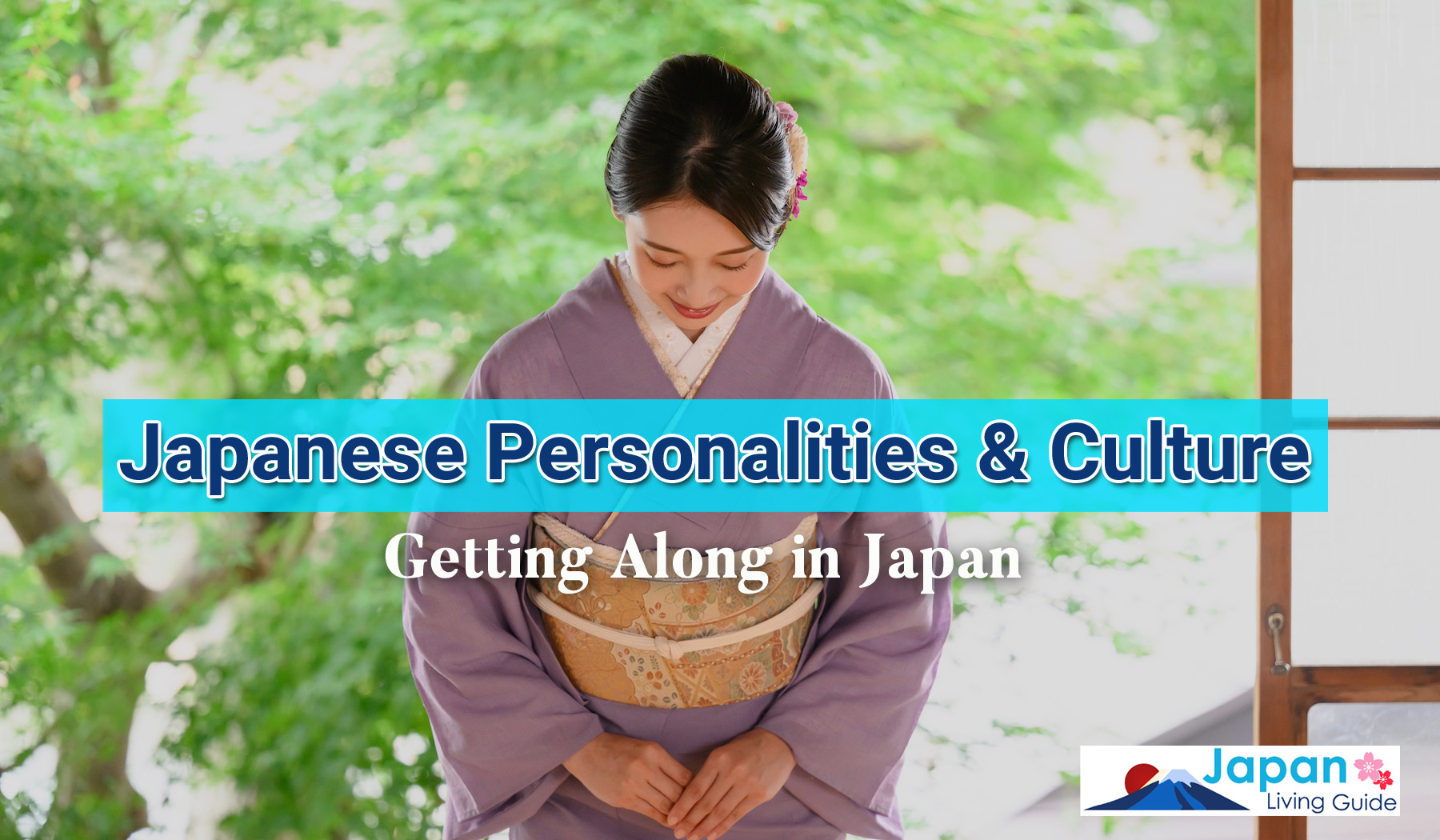Japanese Personalities & Culture: Getting Along in Japan

Living in Japan, or even visiting, can be a significant shift from living in one’s home country and culture. Understanding new cultural norms, practices, and traditions can be difficult, and understanding the reasoning and mentality behind them can be even more of a challenge. When experiencing and taking part in a different culture, it is essential to do your best to understand common personality traits and cultural aspects to live comfortably, both for yourself and those around you.
Understanding the Japanese Mindset

While there is no “Japanese personality” and every person is unique, some aspects commonly show through in Japanese culture and are often typical characteristics in most Japanese people. These include elements like a commitment to the collective cultural mindset of Japan (as opposed to the individualistic mindset of many Western countries) and the importance of values such as harmony, respect, and humility.
Harmony, Consideration & Obligation
A few key concepts are commonly used, to sum up the core values of Japanese society. These include harmony, consideration, and obligation.
>> Japanese Verbal & Nonverbal Communication for Business
Harmony (wa)
This is perhaps the most important of the three. It is considered so essential to society that the kanji, 和, refers to Japan itself and harmony. In a Japanese environment, it is necessary to maintain peace and not do anything to disrupt the harmony of the situation. This also contributes to the collective culture of Japan.
For example, the need to maintain harmony can be seen through a common reluctance to express strong opinions, especially those that differ from the standard. This is also clear in the conflict-avoidant nature of Japanese society.
Consideration (omoiyari)
This concept is primarily related to empathy, or considering the feelings and wants of others and acting in accordance. It is essential to act in a way that will not upset or disturb other people. This can be exhibited in small or large actions.
Omoiyari can be seen in several actions, such as avoiding loud speaking or talking on the phone while on the train and keeping public places clean. These actions help to provide a comfortable environment for others, even if it inconveniences you.
Obligation (giri)
While the idea of duty or obligation sounds somewhat negative initially, it mainly refers to following social “rules” or norms. Following standard etiquette in how to act towards friends, family, co-workers, and strangers is all part of your social obligation.
Obligation is apparent through several etiquette conventions. Another area that can be seen is in Japanese gift-giving culture and the common practice of buying a gift in return after receiving one.
Key Traits of Japanese Personalities
Several personality traits can be commonly seen in many Japanese people. While these are not universal among Japanese people, and there are always exceptions, they are widespread and are often considered Japanese traits. These include having a reserved nature, being polite, being punctual, and being hardworking.
Being Reserved: It is common for Japanese people to appear reserved, especially in public. While some people have an extroverted personality, it is common to suppress this around certain groups or situations. This comes back to the collective nature of Japanese culture and the need to keep a harmonious atmosphere without disturbing others.
Politeness: Japanese people are often considered very polite. Japan has many etiquette standards, and it would be very unusual to not teach a child how to follow them. Being polite also helps to put forward a good ‘face’ and is considered part of the structure of society.
Punctuality: Being late is seen as disrespectful to the other party as if you don’t value their time and work. When attending meetings and appointments in Japan, it is best to arrive early or be on time at the latest. Even casual catch-ups with friends expect a high standard of punctuality.
Working Hard: The high level of hard work in Japan is now world-famous, with the amount of overtime done by many workers held up as a prime example. Many Japanese people are very hardworking and are very committed to their work. This is related to the critical values mentioned above, with a strong sense of duty and obligation and a need to maintain the harmony of doing overtime when everyone else is doing overtime.
These traits are exhibited through daily life and social interactions in Japan. For example, politeness can be seen in the high level of customer service and going well beyond what is needed for customers in service industry interactions. The reserved nature required for specific situations can be seen if you have friends who are loud and talkative in private cases but quiet and reserved in public situations, such as on the train.
Japanese Culture and Etiquette
Several Japanese cultural and etiquette practices should be followed while visiting or living in Japan. These can include customs like bowing, gift-giving, and dining etiquette (which may differ from dining etiquette in your home country).
Bowing
Bowing is one of the most well-known Japanese cultural practices and is relatively easy to participate in. While there are extensive rules about how to bow for different situations, foreigners aren’t expected to understand all the rules, so a standard bow works in most cases. A general rule is that a more profound bow equals more respect, while a light head nod is more of a casual greeting. Bowing indicates respect, not only for the other person but for Japanese culture in general.
>> Japanese Body Language and Gestures
Gift Giving & Omiyage
Japan has an extensive gift-giving culture with many rules about how, when, and what to give as a gift. These often follow strict etiquette rules. One of the most common and casual types of gift-giving is omiyage or souvenir gifts. These are given to friends, family, or co-workers after traveling somewhere. There are omiyage stores throughout Japan selling local specialties in beautiful packaging, ideal for presenting to your friends or family back home. This is a fun and easy part of the gift-giving culture to take part in.
>> 30 Best Japanese Gift Ideas for Any Occasions
Dining Etiquette
Japanese dining etiquette is similar to Western dining etiquette in that it covers a range of practices regarding how to act while at the table. However, Japanese dining etiquette has some unique aspects, such as removing your shoes when entering a restaurant with tatami mat flooring and using the oshibori, or hand towel, to clean your hands before eating and not for cleaning the table.
There are other unique aspects, such as never leaving chopsticks standing upright in food, pouring drinks for others instead of only for yourself, and never lifting the main dish to eat from it.
These practices are standard for interacting in Japanese society. While it is unlikely people will be rude or disapproving if you take part, it will be greatly appreciated if you do. Participating in these cultural practices can also help further understand Japanese culture.
>> Eating Outside in Japan: Know the Rules, Avoid a Food Fight
Practical Tips for Interacting with Japanese People
Navigating Social Interactions
While in Japan, it is crucial to consider Japanese cultural norms and values when navigating social interactions. By doing so, you will be able to have not only better interactions but a more comfortable life overall.Your manner can also help build relationships over time, as acting polite, humble, and calm will allow you to build relationships more easily.
It is necessary to respect the values of Japanese society and understand how to work with the common traits found among Japanese people. This can include following standard Japanese etiquette norms, such as staying quiet on the train, queuing politely in public, not being too assertive when stating an opinion, and generally being respectful of others.
Do’s & Don’ts of Interacting with Japanese People
Building relationships can help you to understand and participate in cultural practices. However, it is necessary to go into these interactions with respect. This includes respecting the etiquette and norms of Japanese social interactions.
Some everyday things to consider involve respecting punctuality, as most Japanese people do. If you are late, try to contact the other person in advance and apologize for your lateness. If you are eating together, follow standard dining etiquette, such as using the oshibori correctly and not putting your chopsticks upright in the rice.
As with all relationships, finding common interests can be a great way to relate and find common ground. Doing your best to not only respect but also emulate the values of Japanese society will also help in this endeavor.
Embracing the Cultural and Personality Traits of Japan
Japanese culture and practices are informed by several key concepts that form the structure of Japanese society. These concepts also influence the common personality traits of many Japanese people. When visiting or living in Japan, understanding and learning about these concepts can help to improve your general interactions with Japanese people. Taking part in Japanese cultural practices can be a great way to learn more about both Japanese culture and these concepts and values.
Like what you read? Be sure to check out more articles on daily life and living in Japan!

















